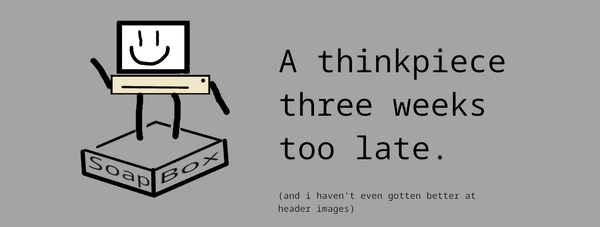What I Was Doing Instead of My Homework
Remember when the web was about building communities and not about selling ads?

The Web That Was is a collection of memories of the Internet (yes, nerds, technically not just the web) before it consolidated to 4 or 5 websites. You can learn more about my motivations from this post. These are mostly a personal retelling of memories and not well-researched information about general topics. If you are looking for something like that, though, https://thehistoryoftheweb.com/ seems like a good resource. Btw if you want to share some of your own memories, feel free to post 'em to #thewebthatwas on BlueSky.
I remember back when I first started using Reddit. They had just introduced a handful of subreddits, but hadn't yet added the ability for people to create and moderate their own. As someone moving over from Slashdot, I thought it was kinda cool. But as a long-time Internet forum user, I worried about the possibility of so many small, unique communities being subsumed and consolidated into this centralized entity.
Probably I didn't actually have such clear foresight as I've given myself in the memory. But as someone used to visiting several entirely separate websites for different interests, the thought of staying on the same website and interacting with some of the same people for different types of interests was both thrilling and terrifying.
But this post isn't about Reddit. Or at least not directly. It's not even about forum life generally. It's about one specific forum - and its associated IRC channel - and how it set me on the path I am on today.
Forums?
But first, what even are Internet forums and IRC channels? Probably if you're reading this you already know, but I realized in a prior post I forgot to explain what a "C64" is so let's just be safe here.
Forums are still pretty common these days, I feel like. But not quite as common as their evolutions: Reddit and Facebook Groups.
Forums are a place for communities to come together and talk. Specific forum nomenclature varies by framework and community, but typically you'll have a few levels of organization within a forum: categories that contain sets of sub-forums (or topics) that contain the actual threads (or posts) that members might make. Sometimes forums were organized around a specific subject, interest, or hobby. Other times, forums would be more general-interest and based on a specific community or group of people. Somewhat commonly, forums would move from the former to the latter as the community grew larger, grew closer, and grew more comfortable talking about a variety of the topics. Even smaller forums would have "Offtopic," "General Discussion," or "Chat" type topics for any discussions separate from the main topic of the forum.
If you've never seen a forum before, the one for the popular phpBB forum software looks like this today for reference:

phpBB has been around basically forever (apparently since 2000) and at one time anyway powered a huge portion of forums across the Internet.
Forums were great because they were relatively-closed communities. Some forums required submitting an application for membership or even paid membership, but even those with open sign-ups you still ended up with a relatively-stable set of community members simply due to the gate of having to sign up for an account. You can still get that feel from certain Subreddits or Facebook Groups (at least back when I last used either around 2020), but the barrier to membership there is typically much lower and so the turnover is much higher.
Reddit and Facebook more closely resemble the X or Insta sort of "literally anyone in the world can stop by and tell you what they're thinking about this topic" model. That's not to say there was no drama or disagreement on forums - on the contrary forums are famous for their drama. But any forum worth sticking around would have moderators or other staff members to sort out the worst of it. For me, there's a difference between interpersonal but intracommunity conflict on a forum as opposed to the background radiation of low-value noise from outside the community you'll often end up with on other platforms.
IRC?
Okay, so you probably already knew about forums. And you may even be a member of a forum or two - like I said they're still pretty common in certain types of communities.
But what about IRC - Internet Relay Chat? I feel like it was already pretty niche when I was using it in the late-90s/early-2000s and seemingly has only gotten moreso.
I'll spare you much of the technical details and features of IRC as well as specific historical events and such. But it's all fascinating and well worth a read if you're interested in it.
Anyway, IRC was the standard, open protocol for group chat on the Internet. Think of it like Slack workspaces or Discord "servers," but the servers really were separate servers run by separate entities - though there have been a few big "networks" over the years where most activity congregated. In the open source space, Matrix is an attempted successor to IRC.
Each IRC network contained a collection of self-managed "channels" - public or private - where actual chatting happened. Owning a channel was as simple as creating it (leaving aside the NickServ and ChanServ details), and many forum communities had associated IRC channels on one of the major networks.
You could join an IRC network using one of several clients - several different terminal clients and GUI clients exist. And these days browser-based clients are quite common. Different networks and different clients all had different subsets of features. But, by and large, if you've used Discord or something you have a good feel for what IRC was like - just less gifs and no reactions.
One interesting difference between IRC and modern chat platforms (and even other proprietary chat platforms of the day) is that IRC didn't offer any persistent chat history. If you weren't connected to the network and present in the channel, you would join back in to an empty chatlog. Some channels used loggers to record the history and make it available on the web for later reference, but many didn't bother since so much chat is so low-value in the end and anything important could be persisted in other ways.
One bit of IRC-specific culture I'll share is the quotes database that used to be maintained at bash.org. I guess it went down a couple years ago, but you can find a mirror to browse if you're curious what sorts of chat you might encounter in different parts of IRC.
What were we talking about?
Oh, right, my memories of actually using these things in the past. This one isn't so much a single memory as a story about a few years of my life.
Like with most of my stories, the specific years and dates have been lost to the mists of time and many of the specific specific details are composites of several memories and reproductions based on research.
This story starts...some time around the turn of the century. Middle school, maybe freshman year of high school. We'll say 2002. I was at my friend's house and we were doing computer stuff. Not sure if we'd upgraded from Rollercoaster Tycoon to Counter-Strike quite yet, but we were somewhere in there. We were doing usual after-school stuff - playing games, browsing the web, chatting on AIM, that kinda thing. At some point, we found that my friend's browser's homepage had been changed at some point to something that looked like a virus.
This was a common bit of malware back then called browser hijacking which was basically a virus that would do things like change your homepage and spawn random pop-up ads. I thought I remembered it specifically being CoolWebSearch, but Wikipedia says that first appeared in 2003, so maybe let's revise that 2002 up above to a 2003 just in case.
Eventually, we found our way to a forum called SpywareInfo where we posted a thread and the friendly denizens helped us clear everything up. My friend went back to playing Counter-Strike, and I had a whole new hobby/obsession (well, in between Counter-Strike matches). That's right, I stuck around the forums and got involved.

Unfortunately, the forums are no longer around so I wasn't able to browse around and find any of my old posts. But, through the magic of the Wayback Machine, I did find my user profile page (not linked) complete with cringey forum signature, my AIM screen name, my full birthday, and my home town. Woof, maybe I didn't learn so much about Internet privacy there as I thought. This was after a data loss and forum migration event (I can tell cause my user id is suspiciously low), but I can see I had about 500 posts in 4 months at that point, so I was pretty active.
I didn't have a busy (offline) social life in high school. And I wasn't doing any homework either cause that wasn't my thing. So I had a lot of leisure time on the Internet. When I wasn't playing Counter-Strike, I was hanging out on the SpywareInfo forums and IRC channel making friends, helping folks, and learning things. Indeed, I even joined their "Boot Camp" program and passed an exam to become an official "Helper." There were other forums I visited, including one for philosophical/religious debate cause I was such a fuckin' dweeb, but most of my time was on SpywareInfo.
I learned a lot about computers and I learned a lot about how to provide tech support for people - especially ones who don't necessarily know what the right question is to ask. I didn't go on to be quite as successful as fellow community member Marcin Kleczynski who built the Malwarebytes anti-malware tool (I do remember chatting with him on IRC and trying an early build of the tool, though). But I made friends, I found mentors, and I learned a lot that I've taken with me even to this day. Even if I haven't necessarily thought about any of it in over a decade.
Lessons
Ultimately, I stopped checking in with SpywareInfo at some point. I'm not sure if it was intentional or if I got a chance to say goodbye to everyone, or if I just got busy maybe with work and and school and real life. But I am thankful for my time there.
Like I did in the last post, what does this memory tell me about how I'd like to interact with the Internet now?
Well looking back, I already see a lot from those days that still influences how I interact with the Internet, both personally and professionally. I very habitually answer questions and provide support in any online space I find myself. At work, jumping into threads on Slack - even ones that have nothing to do with me or my team - to ask for clarification, offer suggestions, or provide support. Outside of work, hanging out in the Discord for a retro gaming console to learn and to answer questions in return, to make friends, and to build fun little tools. It's a different topic and a different set of tools, but I see a lot of the same behaviors in it.
Until I started drafting this post, I hadn't really noticed the parallels. But I do find them very interesting and maybe even heartening.
The Web should be helpful. I got into this whole thing because I needed help and there was a group of people offering that help. So much of the web these days seems designed to sell you something, it's almost quaint to think about this forum filled with an organized community of people there to provide help for free.
The Web should build skills. Once I got the help I needed, I stuck around and learned. The skills I learned from these people - technical and interpersonal - really did help get me to where I am today both personally and professionally. I was super lucky to have all of these resources available to me for free and that I had the opportunity to make use of them.
The Web should foster communities. I can't state enough how much I was just some high school nerd with nothing better to do and this community let me become involved and invested time an energy in me to the point that they were comfortable saying "this literal 14 year old knows enough about this stuff to help people out with no supervision." There are so many more resources for "building communities" these days, but so many of them are just excuses to keep you on a website and serve you ads or ways to sell you subscriptions for content creators where the platform can take a share.
Now all of this stuff is still out there on the web. There are still forums and subreddits and discords and slacks and on and on with excellent communities. There are YouTube videos where you can learn almost any skill for free. But when I think of the web it's not really high up on the list of things that spring to mind. And for the things that do come to mind, they're centralized, corporate platforms. How many communities only have a Facebook group? How many organizations only have a Facebook page?
There are alternatives out there - Matrix for Discord, Lemmy for Reddit, Peertube for YouTube. Not to mention IRC is still around, as is phpBB. And other forum software like nodebb exists (and just added ActivityPub support). But some of these solutions have certain political baggage or technical barriers to entry that hinder adoption.
I wonder what we can do to get community tools back into the hands of communities.



![A poorly-drawn cartoon computer with a happy face on the monitor stands next to text: "Don't say tariffs [x4]...oops"](/content/images/size/w600/2025/04/dontsaytariffs.png)
